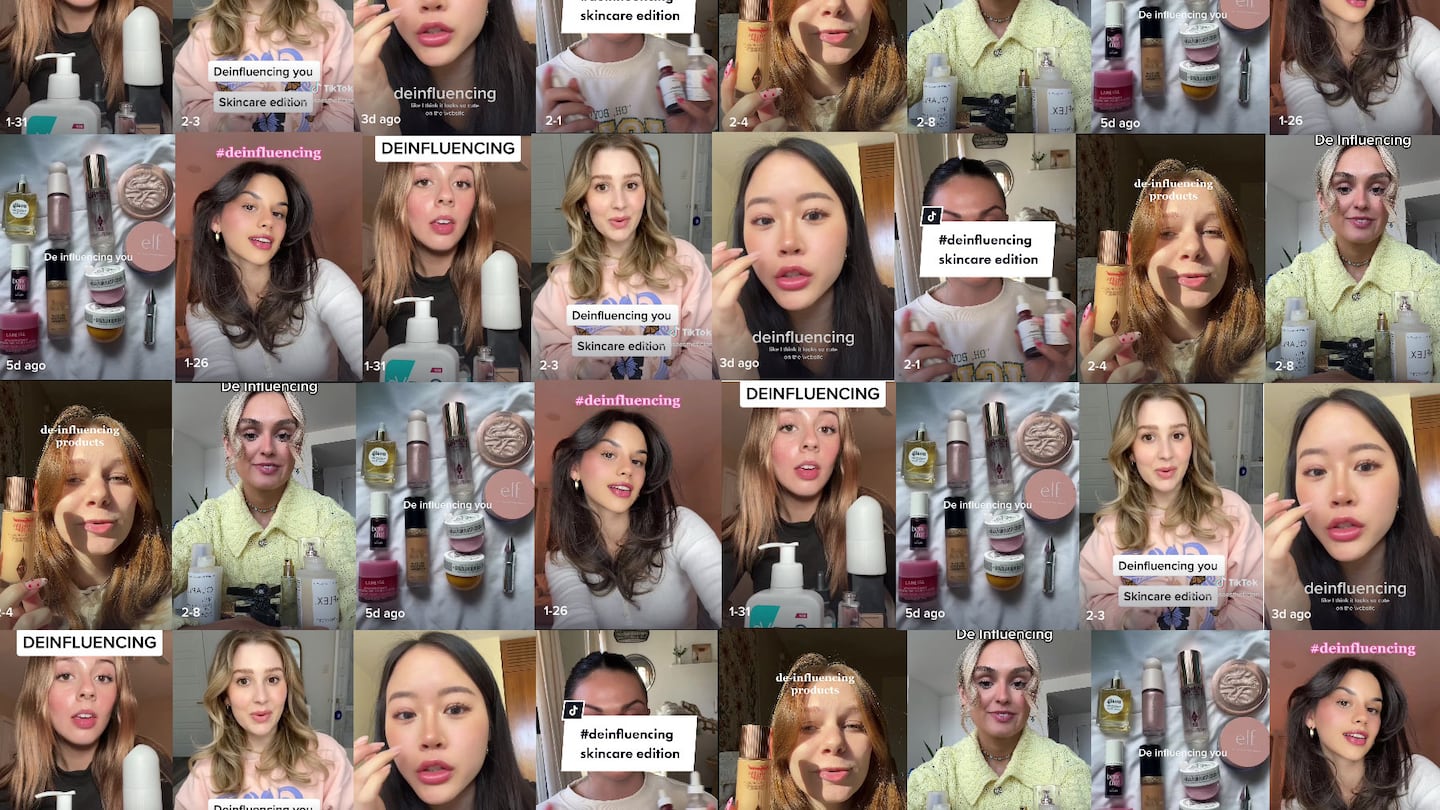
The Business of Fashion
Agenda-setting intelligence, analysis and advice for the global fashion community.

Agenda-setting intelligence, analysis and advice for the global fashion community.

Valeria Fride, a burgeoning TikTok creator, has grown her follower count on the app to 15,000 with makeup tutorial and holiday gift guide videos as she shares her go-to products for various occasions.
But in her most successful video yet, she took the opposite approach and highlighted TikTok-favourite items, like Olaplex’s shampoo and conditioner and Dior’s Backstage Rosy Glow blush, that didn’t impress her — and viewers loved it. The video, which she published in late January, earned 1.3 million views, with comments like: “This is by far the most informative thing I’ve seen online today.”
Fride’s video capitalised on a new, unexpected trend that has emerged on the social platform in recent weeks. Called “deinfluencing,” it refers to how influencers encourage followers not to buy a product, the opposite tactic found in traditional creators’ playbooks.
Thus far, it’s playing out in a number of ways. Some creators, like Fride, deinfluence their followers from buying one product, only to suggest an alternative. Others fill their deinfluencing videos only with products they tried and didn’t like. A few go a step further and speak out against the “more, more, more” culture that often dominates the shopping conversation on social media, telling users to resist consumption for the sake of consumption and think more critically about their purchases.
ADVERTISEMENT
Deinfluencing is something of an antidote to an online culture that sees TikTok users quickly tout $20 Amazon buys and Sephora cart additions as something “you can’t live without.” But what’s making its rise — 206.5 million views on TikTok and counting — particularly notable is the traction it’s gaining with influencers themselves, a group famous for hyping up certain products. Particularly in fashion and beauty, influencers have sent sales of items like Dyson’s AirWrap hair styling tool, K18′s repairing hair mask and Ugg’s ultra mini boots, to name a few, skyrocketing.
Typically, the proportion of positive reviews on social media typically outweighs the negative. Many creators are often reluctant to speak about products they don’t like for fear of alienating the brand or any other potential or current partners.
“More content that is honest and critical of brands is not necessarily a bad thing,” said James Nord, founder of influencer marketing company Fohr. “But it’s a tough line for influencers to walk because they don’t want to offend their partners.”
While there are plenty of creators who have built trust with their audiences, their success has spurred an explosion of other creators who want to do the same, but may be after short-term affiliate marketing success rather than building longevity in the space.
For creators dealing with swelling competition for brand deals and advertising dollars (which are facing renewed scrutiny in the current economic climate), convincing followers they’re trustworthy has never been more important. Rather than a pushback on influencer marketing as a whole, definfluencing’s emergence actually should serve as a reminder that when it comes to longevity in the influencer marketing space, honesty and candour are essential.
“It’s really an exaggeration of what’s always worked best for influencers, which is going with people who give honest opinions,” said Sarah Flint, founder of her eponymous shoe brand, which frequently partners with influencers. “It’s not always about who has the most followers, but who has the followers that are the most relevant to you and to your brand.”
There are countless ways for consumers to seek out product recommendations today, from customer reviews to shopping roundups in magazines. Influencers are a particularly appealing option for consumers — and brands — because ideally they bring a personal, trustworthy touch to highlighting products.
Nord concedes even when being transparent, creators are more likely to talk about products they enjoy, and simply avoid the ones they don’t. For creators, every brand is a potential partnership and they want to make sure they keep doors open.
ADVERTISEMENT
The difference today, however, is that consumers are more aware of those dynamics, and may question a creator’s motives.
“It’s everywhere, and you turn anywhere on social media and get products pushed in your face,” said Beth Zerdecki, co-founder of shopping recommendation platform Rank & Style. “What’s happening is, influencers are looking for a way to convince followers, ‘I am the most trustworthy.’”
Deinfluencing is a start, but influencers can make more subtle changes, such as being consistent in their recommendations — for example, talking about the same pair of jeans repeatedly over time comes off as more authentic than recommending a different pair every month. Couching their language, too, can help.
“Influencers can shift their messaging away from ‘You have to get this’ or ‘This will change your life’ to ‘This has been great for me; this is how it’s helped me,’” said Nord, while warning, however, they should “not try to push too hard on the fear of missing out” factor that often drives consumers to buy a product.
Of course, there’s risks to such an approach, but there’s also danger in continuing to feed the black hole of you-need-this product picks.
“Now that I’m taking this content creation more seriously, I do always have it in the back of my head that I probably started off on the wrong foot,” said Fride, whose first taste of social media virality came from her deinfluencing video. “But at the same time, it builds a good foundation. A brand deal or two are not going to matter if my audience is truly engaged and interested in what I have to say.”
While deinfluencing is perhaps a sign of an ongoing rise in the standards that audiences hold content creators to, it certainly is not a warning sign of a pending end to the influencer marketing. Quite the opposite; as deinfluencing and influencing are essentially the same thing: online creators guiding consumer purchasing decisions.
“This trend is not a referendum on influencers,” said Vanessa Flaherty, president at influencer management company Digital Brand Architects. “At its core, deinfluencing is still influencing; both are about building trust with your audience.”
A panel of experts, including BoF’s Lauren Sherman and Diana Pearl, detail how the business of influencing has evolved — and where it’s all going.
Virtual influencers had faded from fashion campaigns, but now amid all the metaverse hype they’re popping up again, with Prada and Pacsun turning to virtual faces.
Influencers who gained online fame for offline pursuits are rapidly earning brand attention, but working with them requires a different type of partnership.

Diana Pearl is News and Features Editor at The Business of Fashion. She is based in New York and drives BoF’s marketing and media coverage.
Practitioners of this historically behind-the-scenes profession are building powerful followings, riding a wave of interest in how the fashion sausage is made. But even the highest-profile PRs caution that the client still has to comes first.
Join us for a BoF Professional Masterclass that explores the topic in our latest Case Study, “How to Create Cultural Moments on Any Budget.”
When done effectively, a cultural partnership can rightfully earn its own place in the zeitgeist. But it’s not so easy as just hiring a celebrity to star in an ad campaign; brands must choose a partner that makes sense, find the format that fits best and amplify that message to consumers.
Calvin Klein’s chief marketing officer Jonathan Bottomley speaks to Imran Amed about the strategy behind the brand’s buzzy Jeremy Allen White-fronted campaign.